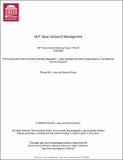The Promise and Perils of Private Voluntary Regulation: Labor Standards and Work Organization in Two Mexican Garment Factories
Author(s)
Locke, Richard M.; Romis, Monica
DownloadSSRN-id1393448.pdf (185.9Kb)
Metadata
Show full item recordAbstract
What role can private voluntary regulation play in improving labor standards and working conditions in global supply chain factories? How does this system relate to and interact with other systems of labor regulation and work organization? This paper seeks to address these questions through a structured comparison of two factories supplying Nike, the world’s largest athletic footwear and apparel company. These two factories have many similarities - both are in Mexico, both are in the apparel industry, both produce more or less the same products for Nike (and other brands) and both are subject to the same code of conduct. On the surface, both factories appear to have similar employment (i.e., recruitment, training, remuneration) practices and they receive comparable scores when audited by Nike’s compliance staff. However, underlying (and somewhat obscured by) these apparent similarities, significant differences in actual labor conditions exist between these two factories. What drives these differences in working conditions? What does this imply for traditional systems of monitoring and codes of conduct? Field research conducted at these two factories reveals that beneath the code of conduct and various monitoring efforts aimed at enforcing it, workplace conditions and labor standards are shaped by very different patterns of work organization and human resource management policies.
Description
This paper is part of a larger project on globalization and labor standards organized by Professor Richard
Locke of M.I.T.. In addition to the results presented in this paper (some of which appear as well in Monica Romis,
"Beneath Corporate Codes of Conduct: What Drives Compliance in Two Mexican Garment Factories," (Masters
Thesis, Dept. of Urban Studies and Planning, M.I.T., 2005)), the project entailed field research in China, Turkey, Europe and the United States as well as systematic analysis of Nike’s factory audits of working conditions in over 800 factories in 51 countries.
Date issued
2009-01-22Publisher
Cambridge, MA; Alfred P. Sloan School of Management, Massachusetts Institute of Technology
Series/Report no.
MIT Sloan School of Management Working Paper;4734-09
Keywords
globalization, work organization, labor standards, codes of conduct